
World Journal of Gastrointestinal Endoscopy
Scope & Guideline
Advancing the Frontiers of Gastrointestinal Endoscopy
Introduction
Aims and Scopes
- Innovative Endoscopic Techniques:
The journal publishes research on novel endoscopic techniques, including advanced imaging modalities, minimally invasive procedures, and emerging technologies aimed at improving diagnostic and therapeutic outcomes. - Clinical Applications and Case Studies:
A significant portion of the journal's content is dedicated to clinical case reports and studies that highlight practical applications of endoscopic procedures in various gastrointestinal conditions, providing insights into real-world challenges and solutions. - Safety and Efficacy of Endoscopic Procedures:
Research focusing on the safety profiles, efficacy, and complications associated with various endoscopic interventions is a core area, helping to establish best practices and guidelines for clinicians. - Gastrointestinal Neoplasms and Surveillance:
The journal emphasizes studies related to the detection, management, and surveillance of gastrointestinal neoplasms, including polyps and cancers, addressing early diagnosis and treatment strategies. - Interdisciplinary Approaches in Gastroenterology:
The journal encourages interdisciplinary research that integrates knowledge from various medical fields to improve gastrointestinal care, showcasing collaborative studies that bridge surgery, pathology, and radiology.
Trending and Emerging
- Artificial Intelligence and Technology Integration:
There is a growing trend towards integrating artificial intelligence in endoscopic procedures, focusing on improving diagnostic accuracy, procedural efficiency, and personalized patient care. - Advanced Imaging Techniques:
Emerging imaging technologies, such as high-definition endoscopy and enhanced imaging modalities, are increasingly featured, highlighting their role in improving the visualization and diagnosis of gastrointestinal lesions. - Multidisciplinary Management of Gastrointestinal Disorders:
Research is increasingly focusing on collaborative approaches that involve multiple specialties in managing complex gastrointestinal disorders, reflecting a trend towards comprehensive, patient-centered care. - Endoscopic Management of Obesity and Metabolic Disorders:
The journal is witnessing a rise in studies related to endoscopic interventions for obesity management, reflecting the increasing recognition of gastrointestinal endoscopy's role in treating metabolic disorders. - Personalized and Precision Medicine in Endoscopy:
There is an emerging focus on personalized medicine approaches in gastrointestinal endoscopy, emphasizing tailored interventions based on individual patient characteristics and disease profiles.
Declining or Waning
- Traditional Endoscopic Techniques:
There has been a noticeable decrease in publications related to traditional endoscopic methods, as newer technologies and techniques gain prominence in clinical practice. - Basic Gastrointestinal Pathologies:
Research on common gastrointestinal issues, such as routine management of uncomplicated conditions, appears to be waning as the focus shifts towards more complex and novel cases in endoscopy. - Emerging Infectious Diseases in Endoscopy:
The volume of papers addressing infectious complications related to endoscopy has decreased, possibly due to improved protocols and preventive measures that have minimized these risks.
Similar Journals

Gastroenterology Insights
Bridging Gaps in Gastroenterological KnowledgeGastroenterology Insights is a premier open-access journal published by MDPI since 2009, focusing on essential research and developments within the fields of gastroenterology and hepatology. With a dedicated ISSN of 2036-7414 and E-ISSN 2036-7422, this journal serves as a vital platform for disseminating innovative studies and insights pertinent to gastrointestinal health, disorders, and treatment modalities. Based in Switzerland, Gastroenterology Insights boasts a significant academic presence, currently positioned in the Q3 quartile for both gastroenterology and hepatology categories as of 2023, reflecting its impactful contributions to the disciplines. With Scopus rankings placing it at the 94th and 48th positions in gastroenterology and hepatology respectively, the journal is committed to advancing knowledge and fostering collaboration among researchers, professionals, and students alike. By providing an open-access model, it ensures that high-quality research is accessible globally, thereby enhancing the reach and impact of crucial findings in the science of digestive health. Researchers looking to publish cutting-edge work will find Gastroenterology Insights a valuable resource for both sharing and acquiring knowledge.
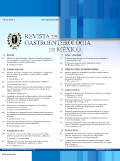
Revista de Gastroenterologia de Mexico
Unlocking the Secrets of Gastrointestinal HealthRevista de Gastroenterologia de Mexico, published by Elsevier, serves as a vital platform for advancing knowledge in the field of gastroenterology. Established in Mexico, this esteemed journal boasts an open access format since 2012, promoting widespread dissemination of research findings and enhancing access for healthcare professionals and researchers worldwide. With its impact factor reflecting a growing recognition in the academic community, the journal is currently ranked in the Q3 category for Gastroenterology, indicating its relevance and contribution to the field. Spanning decades of publication history from 1947 to the present, it offers a wealth of medical insights and serves as a critical resource for those engaged in clinical practice and research. The journal aims to publish high-quality original research, reviews, and clinical studies, making it an essential resource for professionals seeking to stay at the forefront of gastroenterological advancements. Located at Radarweg 29, 1043 NX Amsterdam, Netherlands, the journal embraces a holistic approach to gastroenterology, encouraging contributions that enrich the understanding and treatment of gastrointestinal disorders.

Gastrointestinal Tumors
Exploring New Horizons in Cancer ResearchGastrointestinal Tumors is a reputable, peer-reviewed journal dedicated to advancing knowledge in the field of gastrointestinal oncology. Published by KARGER, this journal has been a pivotal platform since its transition to Open Access in 2014, ensuring that research findings are accessible to a global audience of researchers, clinicians, and students engaged in this vital area of study. With an emphasis on innovative research, clinical studies, and comprehensive reviews, Gastrointestinal Tumors aims to bridge gaps in knowledge and foster discussions that will inform and enhance clinical practices. The journal's commitment to excellence reflects the rising importance of gastrointestinal health in medical research, making it an essential resource for anyone seeking to stay at the forefront of this rapidly evolving field. Based in Basel, Switzerland, it is positioned within a strong academic community, and continues to influence the landscape of gastrointestinal cancer research.
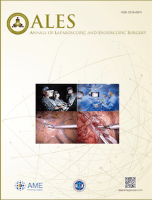
Annals of Laparoscopic and Endoscopic Surgery
Exploring the future of surgery with cutting-edge insights.Annals of Laparoscopic and Endoscopic Surgery, published by AME Publishing Company, serves as a pivotal platform for advancing the field of surgical techniques and technologies. Established in 2019, this journal emphasizes research contributions that enhance the practice of laparoscopic and endoscopic surgery, fostering innovation and clinical excellence. With an Impact Factor that reflects its growing influence in the discipline, the journal holds a respectable Q3 ranking in the Surgery category and is ranked #307 out of 551 in the Scopus Medicine_Surgery sector, placing it in the 44th percentile. This is indicative of its commitment to precise, cutting-edge research and the global relevance of its content. Researchers, clinicians, and students alike will find invaluable insights and a wealth of knowledge within its pages, as it provides open access to a diverse range of articles aimed at improving patient outcomes and surgical methodologies. The journal is based in Shatin, Hong Kong, China, and continues to push the boundaries of surgical research through its dedicated publication efforts.
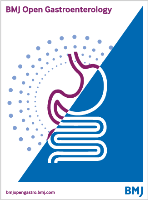
BMJ Open Gastroenterology
Advancing Gastroenterology Through Open Access ResearchBMJ Open Gastroenterology is a premier open access journal published by the esteemed BMJ Publishing Group, focusing on the dynamic and evolving field of gastroenterology. Established in 2014, the journal has rapidly ascended in stature, reflected in its impressive 2023 Q1 ranking in gastroenterology and its position within the top 25% of journals in the category according to Scopus. With a mission to disseminate high-quality, peer-reviewed research with global significance, the journal provides a vital platform for researchers, professionals, and students alike to share their findings and advancements in gastrointestinal medicine. Operating from its headquarters in London, England, the journal's open access format ensures wide visibility and accessibility of cutting-edge research, making it an invaluable resource for those dedicated to improving patient care and driving innovation in gastroenterological sciences. By engaging with this journal, contributors and readers can stay at the forefront of critical developments in the field, fostering a collaborative environment for knowledge exchange.

DEN Open
Empowering innovation in healthcare research.Welcome to DEN Open, a pioneering journal published by WILEY, dedicated to advancing the field of medicine through an open-access model. Established in 2021, this journal serves as a platform for innovative research in various medical disciplines, including surgery, gastroenterology, and internal medicine. With a focus on disseminating high-quality, peer-reviewed articles, DEN Open aims to foster collaboration and knowledge sharing among researchers, professionals, and students worldwide. Despite its early years, the journal has already established itself within the competitive landscape of medical publications, ranking in the 41st and 29th percentiles in its respective Scopus categories. This underscores its commitment to scientific rigor and impact within the realm of medicine. As we converge towards 2025, DEN Open invites submissions that contribute to the evolving dialogue in healthcare, enhancing the intersection of knowledge, practice, and patient care.
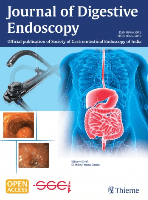
Journal of Digestive Endoscopy
Connecting Knowledge with Clinical ExcellenceJournal of Digestive Endoscopy is a premier academic journal published by THIEME MEDICAL PUBL INC, focusing on the rapid advancements and innovative techniques in the field of digestive endoscopy. Established as an Open Access platform since 2011, this journal aims to disseminate high-quality research, reviews, and clinical studies that contribute to the understanding and improvement of digestive health. Featuring a broad spectrum of topics ranging from diagnostic procedures to therapeutic interventions, the journal serves as an essential resource for researchers, clinicians, and students alike who seek to enhance patient outcomes and advance their knowledge in gastroenterology. With its commitment to accessibility and academic rigor, the Journal of Digestive Endoscopy plays a vital role in fostering collaboration and innovation within the scientific community.

Clinical Gastroenterology and Hepatology
Innovating Insights for Digestive HealthClinical Gastroenterology and Hepatology, published by Elsevier Science Inc, stands as a leading journal in the fields of gastroenterology and hepatology. With an ISSN of 1542-3565 and an E-ISSN of 1542-7714, this esteemed publication has earned its place in the top quartile (Q1) of both gastroenterology and hepatology categories as of 2023, ranking 6th out of 167 and 7th out of 82 respectively. The journal aims to disseminate innovative research, clinical studies, and case reports that advance the understanding and treatment of gastrointestinal and liver diseases. Targeted towards researchers, healthcare professionals, and students, it provides crucial insights into emerging therapies and medical advancements. Clinical Gastroenterology and Hepatology is not only a pivotal resource for contemporary gastroenterological research but also fosters collaboration and knowledge-sharing within the medical community. With a converging publication history from 2003 to the present, the journal continues to build on its solid foundation of scientific excellence and relevance.

BMC GASTROENTEROLOGY
Exploring New Frontiers in Gastroenterology ResearchBMC Gastroenterology is a premier open-access journal published by BMC, dedicated to disseminating high-quality research in the field of gastroenterology. Established in 2001 and headquartered in the United Kingdom, this journal aims to enhance the understanding of gastrointestinal disorders through innovative research, reviews, and clinical studies. With an impressive impact factor and ranking within the Q2 category in gastroenterology and miscellaneous medicine for 2023, BMC Gastroenterology plays a critical role in advancing knowledge and practices in the field. The journal's commitment to open access ensures that researchers, professionals, and students worldwide can freely access and share vital findings and insights. Encouraging collaboration and knowledge transfer, BMC Gastroenterology is an essential resource for those dedicated to improving gastrointestinal health and outcomes.
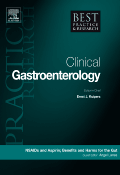
Best Practice & Research Clinical Gastroenterology
Elevating Standards of Care in Gastrointestinal MedicineBest Practice & Research Clinical Gastroenterology is a leading journal in the field of gastroenterology, published by Elsevier Science Ltd, that aims to disseminate high-quality research and evidence-based guidelines for clinical practice. With an impressive impact factor and ranked in the top tier (Q1) of gastroenterology journals as per Scopus, it is recognized for its critical role in advancing knowledge and best practices in clinical settings. The journal is published biannually with content that spans a wide array of topics affecting the gastrointestinal tract, and it encourages contributions from researchers and professionals who seek to enhance their understanding and improve patient care. It's accessible in both subscription and open access formats, allowing for a broad audience engagement and dissemination of pivotal research findings. Since its inception in 1999, Best Practice & Research Clinical Gastroenterology has served as a vital resource for clinicians and academics alike, contributing significantly to improvements in gastroenterological health.